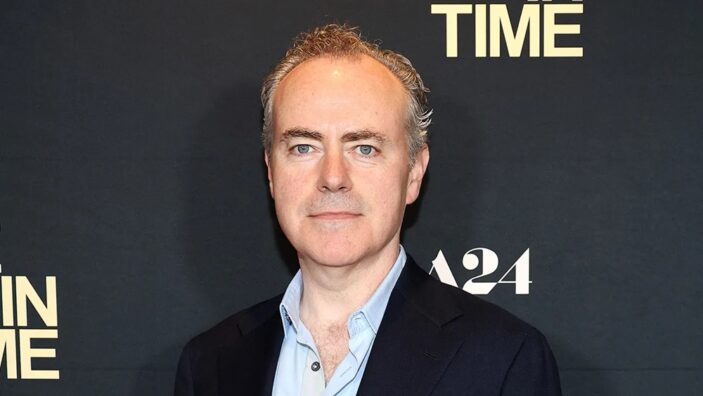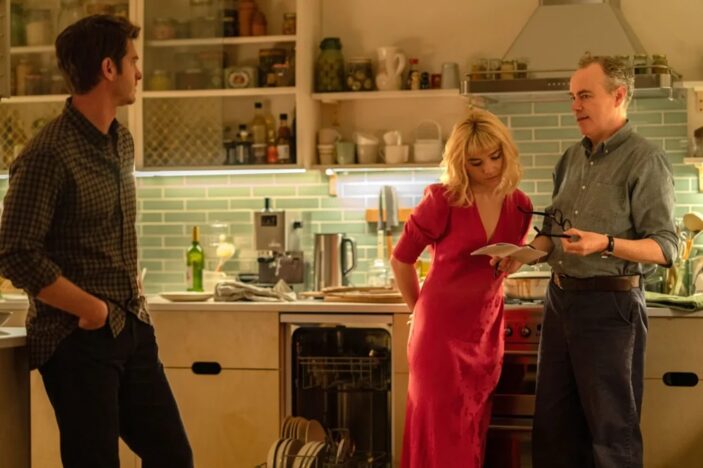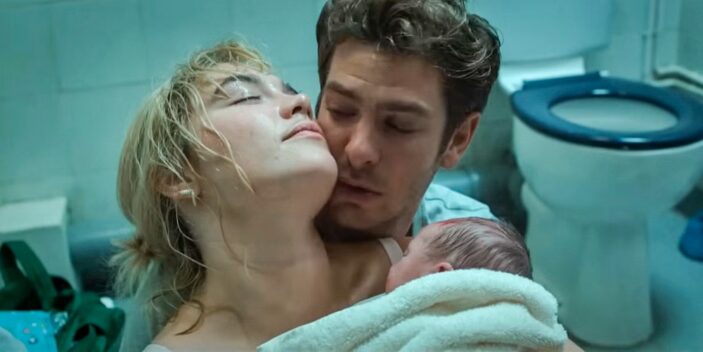
Almut (Florence Pugh) and Tobias (Andrew Garfield) are brought together in a surprise encounter that changes their lives. Through snapshots of their life together – falling for each other, building a home, becoming a family – a difficult truth is revealed that rocks its foundation. As they embark on a path challenged by the limits of time, they learn to cherish each moment of the unconventional route their love story has taken, in a decade-spanning, deeply moving romance; We Live In Time.
Bringing this beautiful story to life is acclaimed director John Crowley (Brooklyn, The Goldfinch), and as the film sets to delight and devastate Australian audiences, Peter Gray spoke with the filmmaker about the importance of chemistry on screen, what proved the most challenging, and the personal reward he’s felt in allowing viewers the chance to truly reflect on their own being.
I was one of the lucky ones to see this at TIFF last year, so I got to be in a big cinema laughing and crying with strangers.
That was a great screening!
Obviously, chemistry is so key with films and stories like this, and Andrew and Florence are just impeccable in this film. How did their casting come about? Did you find their chemistry shaped the final film in many ways you weren’t expecting?
I’d worked with Andrew before on a film called Boy A, many years ago. With this script, I had worked with (writer) Nick Payne for about a year to develop it before we were ready to go to actors. (Andrew) was absolutely front and centre in my mind, because there’s a combination of elements in him as an actor in how easily he handles his own emotions, and how interested he is in exploring that kind of work. And I knew he has a very sort of direct relationship with his own grief. He’d been very eloquent about it, so I suspected this script would be in the sweet spot for him. I didn’t quite know how much of a sweet spot it would be. It really did hit him hard in the solar plexus, and he felt like it was a script that was talking directly to where he was at in himself.
And then about four weeks later, we approached Florence. At first, when we called about Florence, I didn’t know here and had never met her, but I admired a huge number of her performances. She had created female characters that I knew she’d really speak to a side of Almut, and that it would be a great opportunity for her to show some of her acting chops with the kind of vulnerability that was needed for Almut. She wasn’t available when we first approached her. She was doing Thunderbolts*, and we were ready to just reluctantly move on, (but) my casting director made one final call to arrange and would you believe that her film is moving? (Thunderbolts*) was moved back by eight weeks, which was the exact window we needed for her. So, we got lucky there.
Andrew and Florence didn’t know each other, and the first time they met was presenting an Oscar together, which is about as funny or as elite as it gets. I don’t know which way, but in any event, that was their first meeting, and they got on very well. But they were also nervous because, you know, for the film to work emotionally they would have to trust the other person. So rehearsals were very interesting for that, and we got flickers early on that it was going to be special.
To answer your question, that chemistry grew and grew, and the set became about how best to allow that to happen every day. Did it inform the film? Absolutely. I mean, there’s that old kind of cliche, there’s the film you write, the film you shoot, the film you edit, and hopefully they’re all on speaking terms, The film we shot and stitched together as a first assembly didn’t play. It was fine, but it was just a collection…it was a collection of very rich scenes. You could see the material and the playfulness that was in the script. There was all this double and triple signaling going on. You have these amazing performances. Great camera work. But you didn’t quite know which way to find yourself. So, we broke it all apart and started again in the edit. And it was then building the film around a kind of emotional logic.

I wasn’t expecting the non-linear structure. It absolutely adds to the emotional resonance of it all. How did you ensure that rhythm was still natural, whilst carrying that emotional weight?
The short answer is that it took a long time. It was just hacking our way through the jungle. It was bit by bit, and we’d get lose and then you’d find 10 minutes of it that would work, and then something would get snapped. We had a whole wall of the editing room that was all the scene cards, and we would walk away from the material for long period of time. Moving the cards around, trying to get our heads to see the material in a fresh way. See if we could draw new connections between scenes.
We did two test screenings, and they were enormously helpful, but after about three months of editing, we were beginning to feel good about where we had got, but you don’t know if you’ve lost all sense. You need a viewer to tell you. Is it clear? Is it funny? Is it moving? What kind of thing is it? There’s no one size fits all solution to it. You just have to go back and work every day.
Did you find that, going across these different phases of their lives, there was a particular scene or character moment that proved the most challenging or the most rewarding to direct?
I mean the most challenging, logistically, would probably have been the birth scene, (just) because of the number of elements that had to work within it in order for it to just happen as spontaneously as I wanted it to. It had to be planned with this degree of military precision. (Andrew and Florence) were shooting that for a long time. Their exhaustion was real. Florence had “given birth” eight times, so by the time this little baby actor comes in, who really doesn’t give a damn about these actors, there’s just this pure emotional sort of want. It was really moving for everybody.
The cooking competition was hard. To make it feel like a real cooking competition, and to make it feel bigger and busier than it was…that was difficult. Weird and interesting. I realise I should be saying things like the big fight scene in the kitchen was hard, but those are the scenes that, I don’t want to say they’re easier, but it was never about the difficult of how we were going to shoot them. It was really about how quickly those actors were going to peak, which was always towards the end of the shoot. There were no wasted takes with them. It was just about capturing that lighting and making sure everyone was poised to capture it.
The film is very much a two-hander between Andrew and Florence. Even though you have their friends, their parents, their child, but in directing them did you find that time itself became a character?
Yes, particularly in the edit. Maybe more than actually directing. What I mean by in the edit is you have three frames running against each other. You’ve sort of got five years running against five months running against one day, and each of them is sort of different weight of time. Early on, when we were cutting it together, the day that was most difficult to shape was the day in which the birth happens. There’s a huge number of scene where (Andrew and Florence) are just waiting and it’s not moving forward in the way the film is meant to move forward.
In a way it’s sort of this cosmic joke. It’s two people waiting for a baby, and they’re out of time. And it was very important that that line needed to work. So music helped with that. It’s about a clock ticking. So, the time and how to use it became a formal challenge in the edit, and how to actually use it in our favour, rather than it ever becoming a confusing thing.

Did you find that your perspective on relationships, memory or time, evolved in any way after working on the film?
I would say the emotional ambition of the film was to find moments, epic moments, in a very relatable way. I think that when you step back from it, you think that divorce and falling in love, having a baby, dealing with mortality, it’s the stuff of people’s everyday, unromantic, unpoetic reality. It’s just the stuff of grown up life. What we’re trying to do is make a film which would make people relate to that without going, “I don’t need to see that.”
I hear what’s going on in my friends’ lives and everything else, and, of course, it relates and chimes, and you try to make something which is expressive of that. Even if it’s not consistent with it. You have two beautiful film stars, and it’s got music, and the point is what we’re trying to make is something reflective of an experience of life. Hopefully.
I feel like everything is so rushed now when it comes to film and audience attention. I like that this film encourages reflection. How important was it for you to create a space for audiences to pause and just connect with what’s going on?
I would say that’s been the biggest surprise, honestly. It’s been one of the biggest pleasures of watching the film as it’s rolled out. It hits a certain part of the audience very hard and emotionally, and when those people find you out, it’s kind of extraordinary to know their experience. It was very important for me to try and create something around the film that would allow people to have that experience. It’s quite humbling to know that some people have that experience of the film. It’s quite something.
We Live In Time is now screening in Australian theatres.
